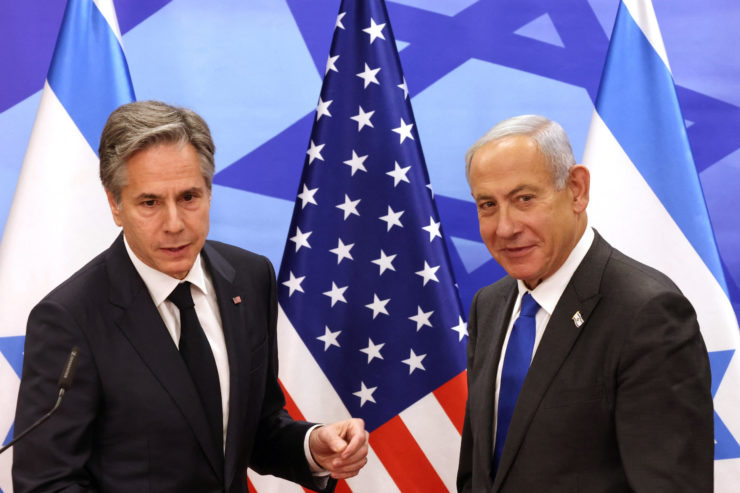Washington’s Double-Game in the Middle East
12.02.2024
The core objective of the U.S. Secretary of State Antony Blinken’s latest visit – which is the fifth such visit since October 7 – to the Middle East is to rally support for a ceasefire plan. The previous four visits, also motivated by the same objective, were unable to bring any meaningful change in Israel’s war on Gaza which has so far killed more than 27 thousand people. The reason why previous US efforts and plans have not worked and the reason why this latest bid is unlikely to produce any immediate and meaningful results is the dual game Washington is playing in the crisis. On the one hand, it is the single biggest enabler of Israel’s war on the Gazans. No other state has supplied more weapons to Israel than the U.S. No other state has extended such diplomatic support to Israel as the U.S. This includes a U.S. veto in December in the UN on a resolution calling for an immediate truce. This support for Israel is both indirect and direct.
As far as direct support is concerned, Blinken’s visit is a major contrast to the air strikes the U.S. has been conducting for the past one week or so on the Houthis and on groups that Washington claims are backed by Iran. So far, dozens of people have been killed in various U.S. strikes. While the question of whether these strikes killed anyone linked with militias remains unanswered, what is certainly obvious here is that the U.S. is now directly involved as a party to the war in the Middle East. From the perspectives of the Middle Eastern states, the U.S. has brought another war to them, which is why these states might be unwilling to accept any plan unilaterally prepared by the U.S., including any plan that might fall short of a permanent resolution of the Palestinian question.
The U.S. actually does not seem to have any plans to put on the table and negotiate. For instance, when Blinken arrived in the Middle East on his fourth visit in early January, most news reports in the Middle East, including those from Israeli media outlets, categorised the visit as mere face-saving. The U.S. basically wishes to continue to engage with the Middle Eastern states and talk of a ‘plan’ to prevent its global competitors from filling in the vacuum.
Blinken, therefore, has so far sent messages that may not have any direct relevance to the immediate resolution of the war. In Egypt, he repeated the usual rhetoric: First, the U.S. continues to view Egypt as a key factor in maintaining regional stability. And second, the U.S. is increasingly concerned by the prospect of Egypt’s economic collapse and the implications for the region.
Yet, when it comes to Israel’s response to Washington’s seemingly hyperactive diplomacy and its rhetorical support for states demanding a ceasefire, Netanyahu’s rejection of any deal and his stubborn pursuit of a “total victory”, Washington seems numb. “Total victory”, Netanyahu reminded his army troops, is the goal,
“because it ensures the security of Israel. Total victory is the only way in which we can ensure additional historic peace agreements, which await. Total victory will strike a mortal blow against the axis of evil: Iran, Hezbollah, the Houthis and – of course – Hamas.
Therefore, there is no substitute for total victory. One need only to think of what would happen without total victory: The displaced will not return, the next massacre will only be a matter of time and Iran, Hezbollah and others will simply celebrate here and destroy the Middle East; therefore, there is no substitute for total victory”.
Keeping Blinken’s repeated visits aside, Washington’s air strikes are directly enabling this total victory. The Biden administration, on top of it, also has other objectives to achieve, i.e., to beef up popular support for his second presidential bid. Biden is actively seeking to convince his voters – and attract more voters – that he is the right man for the job, i.e., to protest U.S. national security interests. Will it have any impact on his political fortunes is, however, a different question.
Biden’s problems are being intensified by the fact that Donald Trump’s pressure is increasing. Donald Trump, who is the likely Republican nominee for the presidential election in November, insisted that the Jordan attack would not have taken place had he been in charge. Trump has also adopted a stance that supports anti-escalation. Indeed, Trump’s vote-bank not only opposes U.S. military entanglements overseas but prefers to see financial resources used domestically, for example, to strengthen the southern border and halt the influx of migrants and asylum seekers.
But the problem for Biden is that most Americans today oppose overseas war, plus they support a ceasefire in Gaza too. Polls show that 84% of Americans worry about getting pulled into war. Some 65% want a ceasefire in Israel’s war on Gaza, not U.S. military action. Only 33% approve of Biden’s handling of today’s crisis.
Therefore, with domestic politics killing the prospects of Biden’s re-election bid, what we can expect from this administration is to keep pulling the crisis from and into multiple sides in the hopes of muddying the waters to such an extent that any resolution of the crisis either does not take place or a crisis of such magnitude happens that might allow Biden to portray himself as the only one with a resolution, were going to ‘isolation’, as Trump might suggest, becomes impossible, and an active engagement becomes indispensable.
Salman Rafi Sheikh, research-analyst of International Relations and Pakistan’s foreign and domestic affairs, exclusively for the online magazine “New Eastern Outlook”
https://journal-neo.su/2024/02/12/washingtons-double-game-in-the-middle-east/


0 Comments:
Post a Comment
Subscribe to Post Comments [Atom]
<< Home